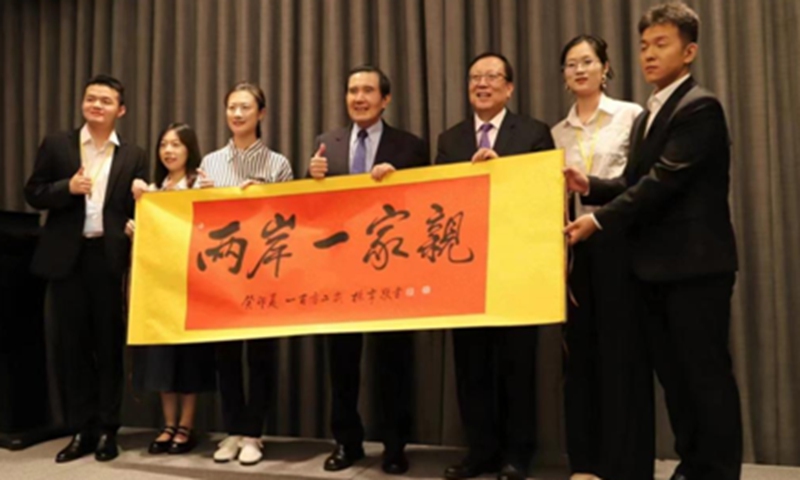Ma returns to Taiwan; calls to recognize historical connections
DPP urged not to misinterpret mainland's goodwill and positive gesture

Ma Ying-jeou (center), former chairperson of the Chinese Kuomintang Party, holds a banner to welcome the visiting Chinese mainland faculty delegation on July 15, 2023. Photo: Global Times
Former chairman of the Chinese Kuomintang party Ma Ying-jeou returned to the island of Taiwan on Thursday after having led a delegation of young people from Taiwan on an 11-day visit to the mainland. Analysts said that while the mainland has shown positive signs to promote the cross-Straits peace and development, the Democratic Progressive Party (DPP) authorities are purposely misinterpreting the goodwill of the mainland to reject reunification. People in Taiwan should be cautioned against the DPP's such acts, they said.
At theTaoyuan airport in Taipei, Ma told reporters that his visit to the mainland allowed Taiwan's youth to deeply understand Chinese history and culture. He said that although Taiwan and the mainland have different political systems, as well as different perspectives and values, we are all descendants of the Yan and Huang emperors, according to a report from Taiwan's news outlet und.com.
Taiwan's youth should set aside ideological differences and recognize the historical and cultural connections between Taiwan island and the mainland. These connections cannot be severed by politics. Ma said he believes that people on both sides of the Taiwan Straits, as Chinese, can resolve disputes peacefully as long as there is a common political foundation - the 1992 Consensus, which allows for continued dialogue between the two sides.
When Xi Jinping, general secretary of the Communist Party of China Central Committee, met with Ma in Beijing on Wednesday, Xi also noted that people on both sides of the Taiwan Straits are all Chinese and the distance of the Straits cannot sever the bond of kinship between the compatriots.
Jack Chang, a young man from Taiwan who now lives in the mainland, said that the mainland's goodwill can be seen and felt throughout Ma's trip. And more young people in the island would be encouraged to come to study or work in the mainland.
"I have confidence in the cross-Straits exchanges," Chang told the Global Times, noting that the DPP's deceitful tactics to manipulate the public and to fool the people are crumbling.
Aside from the DPP-led green camp and "Taiwan independence" separatists, the Taiwan society, in general, took note of the mainland's goodwill and positive attitude overtures to ease cross-Straits tensions and promote exchanges between the two sides during Ma's trip, Wang Wu-lang, secretary-general of the Cross-Straits Peace Forum, told the Global Times on Thursday.
Wang noted that Xi's remarks made when meeting Ma was heartfelt and sincere, highlighting his concern and goodwill toward compatriots in Taiwan. Xi's great cares about the recent earthquake in Hualien also deeply touched the people in Taiwan.
Some analysts said that as the cross-Straits situation continues to escalate due to the DPP's rejecting reunification stance, Ma led a delegation of Taiwan youth to visit the mainland and emphasized the historical and cultural connections between Taiwan and the mainland throughout his trip. This showed that the connection between the mainland and Taiwan cannot severed by the DPP's political "de-Sinicization" moves.
Some of the DPP politicians' rhetoric, responding to Ma's remarks in the mainland, did not represent the concerns of the majority of the people in Taiwan. Wang said that the majority of the people in the island fear that the DPP's "Taiwan independence" separatist stance may lead the island to wars, and what the people desire for is normal exchanges across the Straits as well as peace and stability.
Aside from showing goodwill, the mainland also sent clear message to compatriots in Taiwan, calling on them to jointly safeguard the common homeland of the Chinese nation, to advance toward the historical direction of peaceful reunification and national unity, while opposing the separatist activities of "Taiwan independence" and external interference, said Wang.
Supporters of peace in Taiwan and those advocating for increased cross-Straits exchanges also support Ma's visit to the mainland. They recognize that only through communication can misunderstandings be dispelled and tensions diffused. Those who criticized Ma's trip have their own political calculations, said Shaw Chong-hai, an honorary professor of Macao Polytechnic University, and former dean of the College of Social Sciences of the Chinese Culture University in Taiwan.
Shaw told the Global Times on Thursday that people-to-people exchanges, especially among the youth, has always been important in promoting cross-Straits ties. Shaw also expressed hopes for more young people in Taiwan to pay a visit to the mainland and see the fast and prosperous developments of the mainland cities with their own eyes.
Echoing Shaw's sentiments, Wang also noted that although the DPP authorities remain steadfast in their stance of rejecting reunification, efforts demonstrated by Ma's trip to accumulate positive momentum to promote peaceful development of cross-Straits relations are strong and well defended.